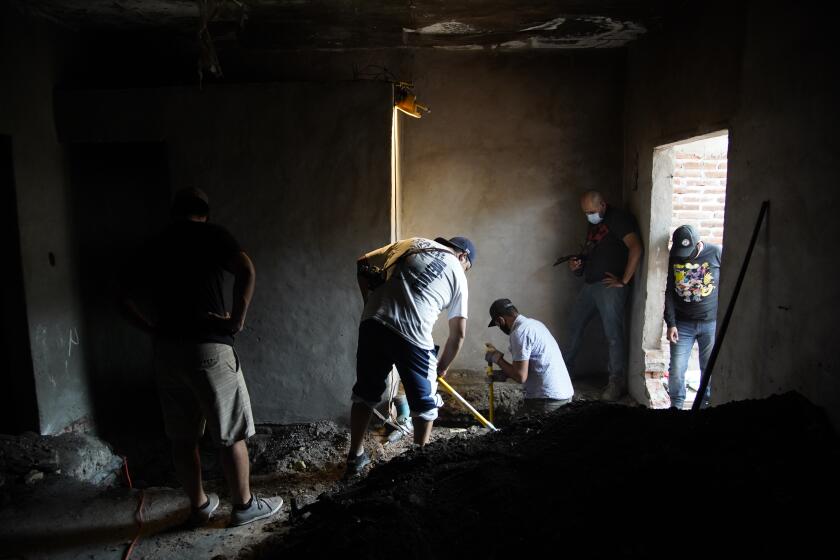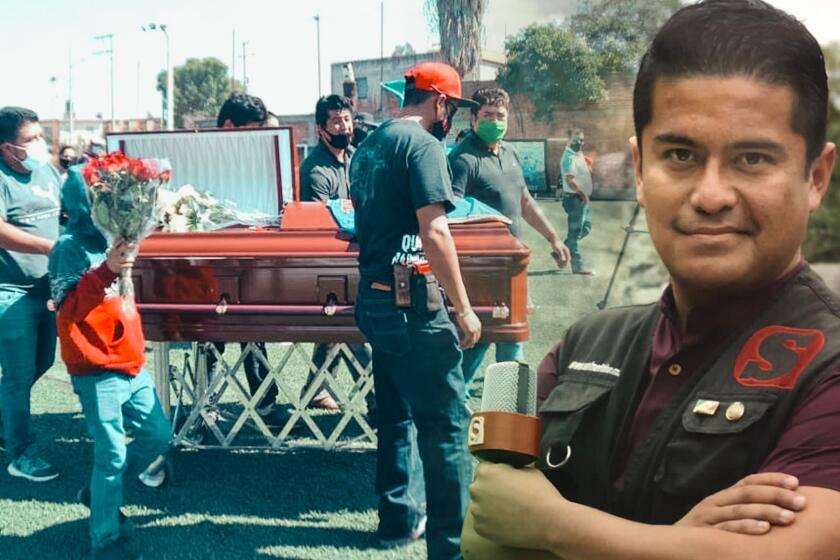Mothers find a dozen bodies in a clandestine Tijuana gravesite
- Share via
TIJUANA — Mothers searching for the remains of their missing children have uncovered at least a dozen bodies after digging since Jan. 2 on a property in the Maclovio Rojas neighborhood in far eastern Tijuana.
The women said they received an anonymous tip about the location. They said the tipster described the property as a potential safe house and dumping grounds for a criminal organization.
Thousands of parents and family members have formed collectives throughout Mexico to help one another search for the remains of their missing children. In Baja California, at least eight such parent collectives have hundreds of members who are searching for lost loved ones.
The collectives organize searches and protests in response to what they label indifference by the Mexican government to protect or find their missing children. They also collectively lobby to gain the attention of state investigators about suspected clandestine gravesites like the one in Maclovio Rojas.
Because the Maclovio Rojas location is considered private property, the search party was not legally allowed to enter the premises to dig for the remains of their children on their own. On Jan. 2, investigators with the Baja California state attorney general’s office went onto the property and located a body. Investigators then packed up and left that same day.
State officials did not say who owns the property.
Angered, the mothers picked up their own shovels and began digging, disregarding trespassing laws out of necessity, they said. They dug for days, insisting there must be more bodies buried on the property, while state officials declined to investigate further.
The parent group eventually located 12 more bodies over the next two weeks, according to the prosecutor’s office and the mothers.
“We really have no other choice. The state has left us with no choices other than to break the law to get answers for the disappearances of our children,” said Bárbara Martínez, whose search for her missing son made international news last year. “I know some of the mothers sometimes think about getting more than just answers. Can you imagine? Sicario [hit man] moms. But I just want to bury my sons. I’m not even asking for justice.”
Following a tip, a distraught mother digs into the foundation of a house, hoping to find the body of her son.
The Maclovio Rojas site is the second parcel of private property the search collectives have entered in Tijuana to look for remains. They say there are dozens more like it. Historically, parents have concentrated their searches on remote areas, but they say cartels have switched tactics and now hide bodies near their safe houses in urban areas, making it more dangerous and harder to excavate.
The Maclovio Rojas property has a house, an outhouse, a garden and two large trees on the premises. The hidden gravesite was located in the northwest corner of the lot. Guided by anonymous tipsters, mothers also found one other body in the southeast corner.
While Martínez searched for her missing son César, her other son, Esteban, 17, went missing in December. Esteban was last seen in the coastal city of Rosarito being taken into custody by local police, his mother says.
Martínez said it’s possible that the remains of one of her sons were among those found in Maclovio Rojas, but will have to wait months for the state prosecutor’s office to conduct DNA testing to find out.
Angélica Ramírez is also looking for a missing loved one. She said at first the parents received little help from authorities.
“[The prosecutor] told me that he could not support me and that he could not even give us security because it would be committing a crime [by entering the premises], and he told me to send him the information,” Ramírez said about state prosecutor Hiram Sanchez.
Later, she said she appreciated that Sanchez showed up to the property when they found human remains, as he promised he would.
Mexican journalists call the crime beat “la nota roja,” the red story. Lurid details guarantee web hits, but documenting the mayhem is among the riskiest assignments.
Ramírez is a member of the Una Nación Busca T, a collective that led this particular search. She said the group had to pool its money to rent a machine to help them clear enough earth to find the remains.
Sanchez has said the state lacks the necessary funds to hire the personnel needed to properly investigate each missing persons or homicide case. Already this year, there have been more than 100 homicides in Tijuana. He said his office was reviewing the forensic evidence collected at the Maclovio Rojas location and collecting DNA from family members of the missing to identify the decomposed bodies.
“Each of the bodies has certain conditions, such as how long they’ve been there and what condition they were in, that determine how we proceed with the forensics,” Sanchez said. He said he visited the property to offer his support to the parents for “their great effort” and show them that the attorney general’s office supports them in their plight.
“Even without investigating, it is logical that these are victims of the struggle for the sale of drugs on the streets in the eastern part of the city,” a government agent told Zeta Weekly, an investigative newsmagazine. He added the criminals appear to be trying to avoid the attention of police by hiding the bodies underneath their safe houses.
Fry writes for the San Diego Union-Tribune.
More to Read
Sign up for Essential California
The most important California stories and recommendations in your inbox every morning.
You may occasionally receive promotional content from the Los Angeles Times.















